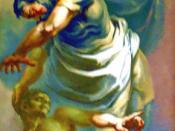God the Deceiver
Have you ever wondered if everything we thought we knew was wrong? That maybe someone was just putting all these ideas into our head? In this paper, I will show several flaws in René Descartes' argument that God is not a deceiver. After introducing René Descartes and his argument, I will take a closer look into what he is actually saying. Lastly, I will introduce several objections and problems with his argument and show the implications that result.
To begin, René Descartes was a French philosopher that lived in the first half of the seventeenth century. He wrote a philosophical book, Meditations on First Philosophy, made up of six meditations in which he attempted to demonstrate the 'existence of God and the immorality of the soul.' The small part of this book I will be focusing on is a paragraph in meditation four. Here, Descartes states that "It is impossible for God ever to deceive me, for trickery and deception is always indicative of some imperfection.
And although the ability to deceive seems to be an indication of cleverness or power, the will to deceive undoubtedly attests to maliciousness or weakness. Accordingly, deception is incompatible with God" (36). Descartes doesn't seem to feel the need to add anything to this argument either in its defense or against it. This one paragraph is, in effect, the entirety of René Descartes argument that God is not a deceiver.
Looking deeper into this argument and taking in account the basic set up of a modus ponens argument, the premises seem to be that (1) deceiving requires either maliciousness or weakness, (2) that maliciousness or weakness are imperfections, and (3) that God is perfect and therefore has no imperfections. He then concludes that God cannot deceive because he can be...


